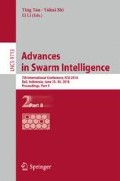Abstract
Given an affine transform image having a distorted appearance, if a transform function is known, then an inverse transform function can be applied to the image to produce the undistorted original image. However, if the transform function is not known, can we estimate its values by searching through this large affine transform space? Here, an unknown affine transform function of a given digit is estimated by searching through the affine transform space using the Particle Swarm Optimization (PSO) approach. In this paper, we present important concepts of the proposed approach, describe the experimental design and discuss our results which favorably support the potential of the approach. We successfully demonstrate the potential of this novel approach that could be used to classify a large set of unseen distorted affine transform digits with only a small set of digit prototypes.
Access this chapter
Tax calculation will be finalised at checkout
Purchases are for personal use only
Notes
- 1.
In contrast to the pixel appearance-based approach, other approaches may possess 3D information of an object of interest.
- 2.
Lecun’s state of the art LeNet-5 can be viewed online at http://yann.lecun.com/exdb/lenet/index.html.
- 3.
Available from http://yann.lecun.com/exdb/mnist/.
References
Lecun, Y., Bengio, Y., Hinton, G.: Deep learning. Nature 521, 436–444 (2015)
Lowe, D.G.: Distinctive image features from scale-invariant keypoints. Int. J. Comput. Vis. 60(2), 91–110 (2004)
Mikolajczyk, K., Schmid, C.: Scale and affine invariant interest point detectors. Int. J. Comput. Vis. 60(1), 63–86 (2004)
Sohn, K., Lee, H.: Learning invariant representations with local transformations. In: Proceedings of the 29th International Conference on Machine Learning, ICML 2012, Edinburgh, Scotland (2012)
Eberhart, R.C., Kennedy, J.: A new optimizer using particle swarm theory. In: Proceedings of the Sixth International Symposium on Micromachine and Human Science, Nagoya, Japan, pp. 39–43 (1995)
Phon-Amnuaisuk, S.: Investigating a hybrid of Tone-Model and particle swarm optimization techniques in transcribing polyphonic guitar sound. Appl. Soft Comput. 29, 211–220 (2015)
Jain, A.K.: Representation and recognition of handwritten digits using deformable templates. IEEE Trans. pattern Anal. Mach. Intell. 19(12), 1386–1391 (1997)
Li, Q., Ji, H.B.: Medical image registration based on maximization of mutual information and particle swarm optimization. In: Proceedings of the 5th International Conference on Photonics and Imaging in Biology and Medicine, vol. 6534, 65342M (2007)
Shannon, C.E.: A mathematical theory of communication. The Bell Syst. Tech. J. 27(379–423), 623–656 (1948)
MacKay, D.J.C.: Information Theory, Inference, and Learning Algorithms. Cambridge University Press, Cambridge (2003)
Gonzalez, R.C., Woods, R.E.: Digital Image Processing. Prentice Hall, Upper Saddle River (2001)
Revow, M., Williams, C.K.I., Hinton, G.E.: Using generative models for handwritten digit recognition. IEEE Trans. Pattern Anal. Mach. Intell. 18(6), 592–606 (1996)
Bottou, L., Cortes, C., Denker, J.S., Drucker, H., Guyon, I., Jackel, L.D., LeCun, Y., Müller, U.A., Säckinger, E., Simard, P., Vapnik, V.: Comparison of classifier methods: a case study in handwritten digit recognition. In: Proceedings of the 12th IAPR International Conference on Pattern Recognition. Conference B: Computer Vision & Image Processing, vol. 2, pp 77–82 (1994)
Liu, C.H., Nakashima, K., Sako, H., Fujisawa, H.: Handwritten digit recognition: benchmarking of state-of-the-art techniques. Pattern Recogn. 36(2003), 2271–2285 (2003)
Ciresan, D.C., Meier, U., Masci, J., Gambardella, L.M., Schmidhuber, J.: Flexible, high performance convolutional neural networks for image classification. In: Proceedings of the Twenty-Second International Joint Conference on Artificial Intelligence (IJCAI 2011), pp, 1237–1242 (2011)
Acknowledgments
We wish to thank anonymous reviewers for their comments that have helped improve this paper. We would like to thank the GSR office for their partial financial support given to this research.
Author information
Authors and Affiliations
Corresponding author
Editor information
Editors and Affiliations
Rights and permissions
Copyright information
© 2016 Springer International Publishing Switzerland
About this paper
Cite this paper
Phon-Amnuaisuk, S., Lee, SY. (2016). Classification of Distorted Handwritten Digits by Swarming an Affine Transform Space. In: Tan, Y., Shi, Y., Li, L. (eds) Advances in Swarm Intelligence. ICSI 2016. Lecture Notes in Computer Science(), vol 9713. Springer, Cham. https://doi.org/10.1007/978-3-319-41009-8_19
Download citation
DOI: https://doi.org/10.1007/978-3-319-41009-8_19
Published:
Publisher Name: Springer, Cham
Print ISBN: 978-3-319-41008-1
Online ISBN: 978-3-319-41009-8
eBook Packages: Computer ScienceComputer Science (R0)

